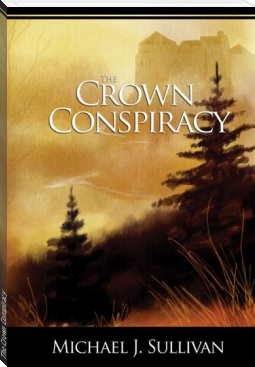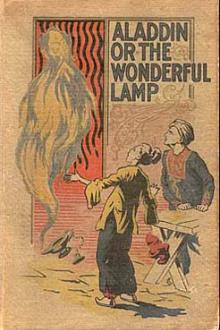Figures of Earth: A Comedy of Appearances by James Branch Cabell (best reads .TXT) 📗

- Author: James Branch Cabell
Book online «Figures of Earth: A Comedy of Appearances by James Branch Cabell (best reads .TXT) 📗». Author James Branch Cabell
XIII What Helmas Directed
Now the Count of Poictesme departs from Provence, with his lackeys carrying his images, and early in April he comes to Helmas the Deep-Minded. The wise King was then playing with his small daughter Mélusine (who later dethroned and imprisoned him), but he sent the child away with a kiss, and he attentively heard Dom Manuel through.
King Helmas looked at the images, prodded them with a shriveled forefinger, and cleared his throat; and then said nothing, because, after all, Dom Manuel was Count of Poictesme.
"What is needed?" said Manuel.
"They are not true to life," replied Helmas—"particularly this one which has the look of me."
"Yes, I know that: but who can give life to my images?"
King Helmas pushed back his second best crown, wherein was set the feather from the wing of the miller's goose, and he scratched his forehead. He said, "There is a power over all figures of earth and a queen whose will is neither to loose nor to bind." Helmas turned toward a thick book, wherein was magic.
"Yes, queen is the same as cwen. Therefore Queen Freydis of Audela might help you."
"Yes, for it is she that owns Schamir. But the falcons are not nesting now, and how can I go to Freydis, that woman of strange deeds?"
"Oh, people nowadays no longer use falcons; and of course nobody can go to Freydis uninvited. Still, it can be managed that Freydis will come to you when the moon is void and powerless, and when this and that has been arranged."
Thereafter Helmas the Deep-Minded told Count Manuel what was requisite. "So you will need such and such things," says King Helmas, "but, above all, do not forget the ointment."
Count Manuel went alone into Poictesme, which was his fief if only he could get it. He came secretly to Upper Morven, that place of horrible fame. Near the ten-colored stone, whereon men had sacrificed to Vel-Tyno in time's youth, he builded an enclosure of peeled willow wands, and spread butter upon them, and tied them with knots of yellow ribbons, as Helmas had directed. Manuel arranged all matters within the enclosure as Helmas had directed. There Manuel waited, on the last night in April, regarding the full moon.
In a while you saw the shadowings on the moon's radiancy begin to waver and move: later they passed from the moon's face like little clouds, and the moon was naked of markings. This was a token that the Moon-Children had gone to the well from which once a month they fetch water, and that for an hour the moon would be void and powerless. With this and that ceremony Count Manuel kindled such a fire upon the old altar of Vel-Tyno as Helmas had directed.
Manuel cried aloud: "Now be propitious, infernal, terrestrial and celestial Bombo! Lady of highways, patroness of crossroads, thou who bearest the light! Thou who dost labor always in obscurity, thou enemy of the day, thou friend and companion of darkness! Thou rejoicing in the barking of dogs and in shed blood, thus do I honor thee."
Manuel did as Helmas had directed, and for an instant the screamings were pitiable, but the fire ended these speedily.
Then Manuel cried, again: "O thou who wanderest amid shadows and over tombs, and dost tether even the strong sea! O whimsical sister of the blighting sun, and fickle mistress of old death! O Gorgo, Mormo, lady of a thousand forms and qualities! now view with a propitious eye my sacrifice!"
Thus Manuel spoke, and steadily the fire upon the altar grew larger and brighter as he nourished it repugnantly.
When the fire was the height of a warrior, and queer things were happening to this side and to that side, Count Manuel spoke the ordered words: and of a sudden the flames' colors were altered, so that green shimmerings showed in the fire, as though salt were burning there. Manuel waited. This greenness shifted and writhed and increased in the heart of the fire, and out of the fire oozed a green serpent, the body of which was well—nigh as thick as a man's body.
This portent came toward Count Manuel horribly. He, who was familiar with serpents, now grasped this monster's throat, and to the touch its scales were like very cold glass.
The great snake shifted so resistlessly that Manuel was forced back toward the fire and toward a doom more dreadful than burning: and the firelight was in the snake's contemptuous wise eyes. Manuel was of stalwart person, but his strength availed him nothing until he began to recite aloud, as Helmas had directed, the multiplication tables: Freydis could not withstand mathematics.
So when Manuel had come to two times eleven the tall fire guttered as though it bended under the passing of a strong wind: then the flames burned high, and Manuel could see that he was grasping the throat of a monstrous pig. He, who was familiar with pigs, could see that this was a black pig, caked with dried curds of the Milky Way; its flesh was chill to the touch, like dead flesh; and it had long tusks, which possessed life of their own, and groped and writhed toward Manuel like fat white worms.
Then Manuel said, as Helmas had directed: "Solomon's provision for one day was thirty measures of fine flour, and threescore measures of meal, ten fat oxen, and twenty oxen out of the pastures, and a hundred sheep, beside harts, and roebucks, and fallow deer, and fatted fowl. But Elijah the Tishbite was fed by ravens that brought him bread and flesh."
Again the tall flames guttered. Now Manuel was grasping a thick heatless slab of crystal, like a mirror, wherein he could see himself quite clearly. Just as he really was, he, who was not familiar with such mirrors, could see Count Manuel, housed in a little wet dirt with old inveterate stars adrift about him everywhither; and the spectacle was enough to frighten anybody.
So Manuel said: "The elephant is the largest of all animals, and in intelligence approaches the nearest to man. Its nostril is elongated, and answers to the purpose of a hand. Its toes are undivided, and it lives two hundred years. Africa breeds elephants, but India produces the largest."
The mirror now had melted into a dark warm fluid which oozed between his fingers, dripping to the ground. But Manuel held tightly to what remained between his palms, and he felt, they say, that in the fluid was struggling something small and soft and living, as though he held a tiny minnow.
Said Manuel, "A straight line is the shortest distance between two points."
Of a sudden the fire became an ordinary fire, and the witches of Amneran screamed, and Morven was emptied of sorcery, and Count Manuel was grasping the warm soft throat of a woman. Instantly he had her within the enclosure of peeled willow wands that had been spread with butter and tied with knots of yellow ribbon, because into such an enclosure the power and the dominion of Freydis could never enter.
All these things Manuel did precisely as King Helmas had directed.
XIV They Duel on Morven
So by the light of the seven candles Dom Manuel first saw Queen Freydis in her own shape, and in the appearance which she wore in her own country. What Manuel thought there was never any telling: but every other man who saw Queen Freydis in this appearance declared that instantly all his past life became a drugged prelude to the moment wherein he stood face to face with Freydis, the high Queen of Audela.
Freydis showed now as the most lovely of womankind. She had black plaited hair, and folds of crimson silk were over her white flesh, and over her shoulders was a black cloak embroidered with little gold stars and ink-horns, and she wore sandals of gilded bronze. But in her face was such loveliness as may not be told.
Now Freydis went from one side of the place to the other side, and saw the magics that protected the enclosure. "Certainly, you have me fast," the high Queen said. "What is it you want of me?"
Manuel showed her the three images which he had made, set there arow. "I need your aid with these."
Queen Freydis looked at them, and Freydis smiled. "These frozen abortions are painstakingly made. What more can anybody demand?"
Dom Manuel told her that he desired to make an animated and lively figure.
Whereupon she laughed, merrily and sweetly and scornfully, and replied that never would she give such aid.
"Very well, then," said Manuel, "I have ready the means to compel you." He showed this lovely woman the instruments of her torture. His handsome young face was very grave, as though already his heart were troubled. He thrust her hand into the cruel vise which was prepared. "Now, sorceress, whom all men dread save me, you shall tell me the Tuyla incantation as the reward of my endeavors, or else a little by a little I shall destroy the hand that has wrought so many mischiefs."
Freydis in the light of the seven candles showed pale as milk. She said: "I am frail and human in this place, and have no power beyond the power of every woman, and no strength at all. Nevertheless, I will tell you nothing."
Manuel set his hand to the lever, ready to loose destruction. "To tell me what I desire you to tell me will do you no hurt—"
"No," replied Freydis: "but I am not going to take orders from you or any man breathing."
"—And for defying me you will suffer very terribly—"
"Yes," replied Freydis. "And much you will care!" she said, reproachfully.
"—Therefore I think that you are acting foolishly."
Freydis said: "You make a human woman of me, and then expect me to act upon reason. It is you who are behaving foolishly."
Count Manuel meditated, for this beyond doubt sounded sensible. From the look of his handsome young face, his heart was now exceedingly troubled. Queen Freydis breathed more freely, and began to smile, with the wisdom of women, which is not super-human, but is ruthless.
"The hand would be quite ruined, too," said Manuel, looking at it more carefully. Upon the middle finger was a copper ring, in which was set a largish black stone: this was Schamir. But Manuel looked only at the hand.
He touched it. "Your hand, Queen Freydis, whatever mischief it may have executed, is soft as velvet. It is colored like rose-petals, but it smells more sweet than they. No, certainly, my images are not worth the ruining of such a hand."
Then Manuel released her, sighing. "My geas must stay upon me, and my images must wait," says Manuel.
"Why, do you really like my hands?" asked Freydis, regarding them critically.
Manuel said: "Ah, fair sweet enemy, do not mock at me! All is in readiness to compel you to do my will. Had you preserved some ugly shape I would have conquered you. But against the shape which you now wear I cannot contend. Dragons and warlocks and chimaeras and such nameless monsters as I perceive to be crowding about this enclosure of buttered willow wands I do not fear at all, but I cannot fight against the appearance which you now wear."
"Why, do you really like my natural appearance?" Freydis said, incredibly surprised. "It is a comfort, of course, to slip into it occasionally, but I had never really thought much about it one way or the other—"
She went to the great mirror which had been set ready as Helmas directed, "I never liked my hair in these severe big plaits, either. As for those monsters yonder, they are my people, who are coming out of the fire to rescue me, in some of the forgotten shapes, as spoorns and trows and calcars, and other terrors of antiquity. But they cannot get into this enclosure of buttered willow wands, poor dears, on account of your magickings. How foolish they look—do they not?—leering and capering and gnashing their teeth, with no superstitious persons anywhere to pay attention to them."
The Queen paused: she coughed delicately. "But you were talking some nonsense or other about my natural appearance not being bad looking. Now most men prefer blondes, and, besides, you are not really listening to me, and that is not polite."
"It is so difficult to talk collectedly," said Manuel, "with your appalling servitors leering and capering and gnashing double sets of teeth all over Upper Morven—"
She saw the justice of this. She went now to that doorway through which, unless a man lifted her over the threshold, she might not pass, on account of the tonthecs and the spaks and the horseshoes.
She cried, in a high sweet voice: "A penny, a penny, twopence, a penny and a half, and a half-penny! Now do you go away, all of you, for the wisdom of Helmas is too strong for us.





Comments (0)